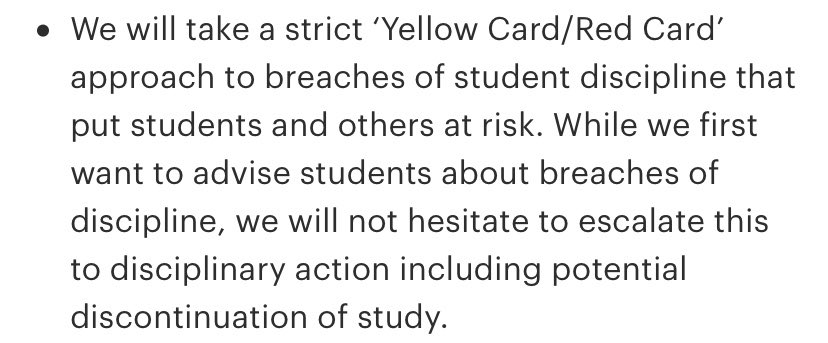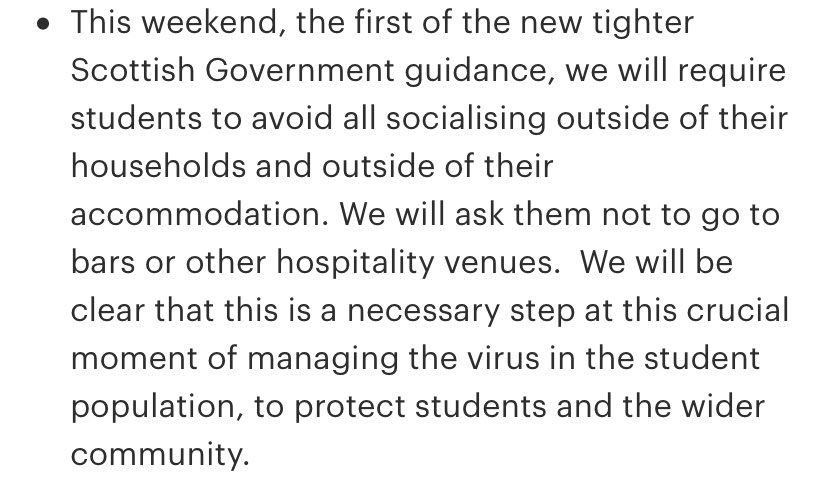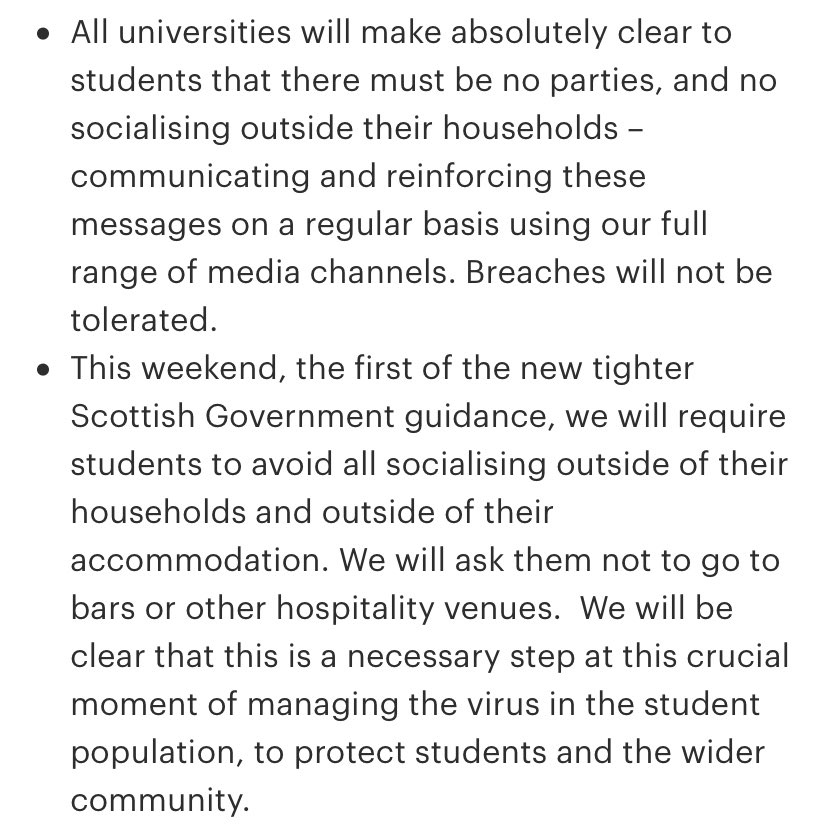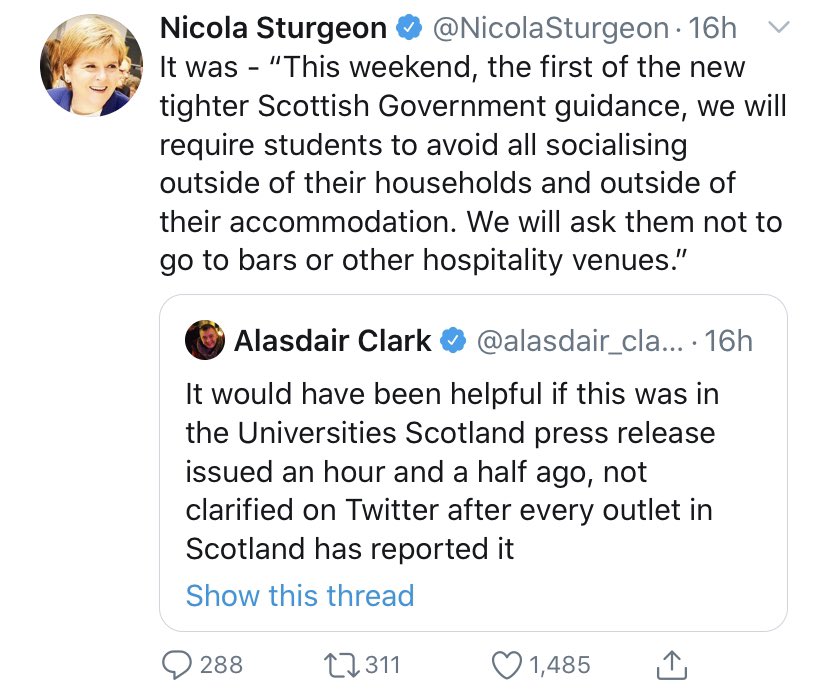The lecture went well (well, I thought so: views may differ) and no-one asked any awkward questions about coronavirus regulations. So in lieu of that, a few quick thoughts about yesterday’s announcement.
https://twitter.com/ProfChalmers/status/1309182719864246280
The announcement yesterday was backed up by some pretty heavy firepower: “...potential discontinuation of study”; “we will not hesitate...” 

That’s pretty strong stuff - getting thrown out of university is a far worse consequence that most people who breach coronavirus regulations will suffer. Threatening those sorts of penalties means you have to be very clear about what might trigger them.
But the statement (universities-scotland.ac.uk/preventing-spr…) is really not clear at all.
First, who is this directed at? Boris Johnson has been widely criticised for referring to students as if they all lived on campus, boarding-school style, but this statement - from Universities Scotland! - falls into the same trap.
Some people were quick to argue that *obviously* it was just about students in halls. But that’s not what it says! And nor is it clear that this is what you’d want for a policy perspective anyway.
Students in halls are not a group neatly sealed off from students not in halls. If you think coronavirus is widely circulating in the student population you might well want the rules to go beyond those in halls. So what was it?
A journalist was given a halfway house answer: it’s about everyone, although it’s very much about those in halls.
https://twitter.com/kieranpandrews/status/1309194015045287937
That might be ok for guidance, where you’re asking people to make a judgment call. It is absolutely not ok when you are threatening people with being chucked out of university.
Secondly, what about this bit? Does it mean this requirement starts this weekend or that it is a requirement for this weekend only? 

The FM had to issue a clarification on this point:
https://twitter.com/nicolasturgeon/status/1309195237332525056
Now, the FM has the benefit of a law degree from *cough* Scotland’s best law school. But I really don’t think this was clear. If it was, it wouldn’t have been necessary for her to tweet a clarification.
If someone had asked me for advice on this I would have had to say I *thought* it was this weekend only but given how the statement was drafted I couldn’t be confident of the intention. That’s not good enough when you’re threatening people with getting chucked out of university.
(The interaction between paras 1 and 2 of the guidance is also very confusing, because if para 2 is this weekend only why does it overlap with para 1, which is not?) 

Thirdly, we obviously can’t do this: not all students have phones capable of running the app and how would we enforce it anyway? 

Fourthly, the statement didn’t recognise that lots of students work in bars and restaurants. Were they barred from going there? It seems not, but again that should have been clear on the face of the statement.
Everyone involved in this has been working in good faith and under great pressure of time. But if you are going to threaten to *punish* people you have to do that on the basis of clear and carefully thought through rules. You cannot do it this way.
Also, the Scottish Government has coercive powers here and can make regulations if it wants to, which has always involved careful drafting. If you circumvent that process by outsourcing coercion to a press release, this sort of stuff happens.
I am absolutely not suggesting that action was not needed here, nor am I taking a particular view on what that action should have involved. But on the one aspect I do know a bit about - drafting rules with punitive consequences - I am very disappointed with what had happened.
Postscript: I suspect the Scottish Government was quite happy to have outsourced rule-making, responsibility and punishment in the way it did yesterday. From various statements today, I equally strongly suspect that it now regrets it.
https://twitter.com/ProfChalmers/status/1309453727221284864
Bypassing the lawyers - pains in the neck who ask you a lot of stupid questions - is always attractive, but the hangover when you have to answer those questions in public instead can be head-splitting.
PPS. The question I would really like to know the answer to is this: who drafted yesterday’s guidance? SG or Universities Scotland?
PPPS. I should add that my own institution has now published guidance which is very good, and much better than yesterday’s statement (gla.ac.uk/myglasgow/news…). I say this because (a) it’s true and (b) I just phoned home and my dad’s first words were “Have you been sacked yet?”
• • •
Missing some Tweet in this thread? You can try to
force a refresh







